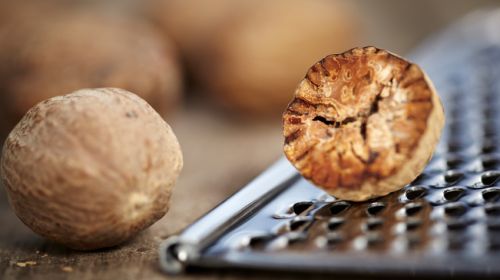Feeling full and stomach pressure is a common symptom that can occur after overeating any food. If it is a constant feeling of fullness, it can also be due to illness. Find out everything about causes and home remedies here.
Feeling of fullness is a discomfort in the abdomen, which is perceived as excessive filling and tension in the upper abdomen, sluggishness of digestion and often in combination with abdominal pain or gas. A feeling of fullness is triggered, among other things, by particularly lavish meals, various gastrointestinal diseases and disorders of the formation of bile acids.
Functional gastrointestinal diseases
The exact mechanism by which bloating occurs has not yet been conclusively clarified. There is no doubt, however, that there is a connection with fat digestion. Food rich in fat promotes the development of a feeling of fullness. Correspondingly, a feeling of fullness is promoted by diseases of the biliary system, which plays a key role in fat digestion and is indispensable for it.
Changes in bowel movements when you feel full
In addition, a close relationship between bloating and the response of the bowel to gases has been found. Although a feeling of fullness may be accompanied by a pronounced increase in the size of the abdomen, the symptoms do not seem to be caused by the sheer amount of intestinal gases. Instead, experiments indicate that the intestinal reaction to gas formation mediated by sensory nerves triggers a feeling of fullness, regardless of the actual gas volume.
When examining the symptom, changes in the bowel movements of the bowel and a changed adaptation of the abdominal wall muscles to increased bowel filling in people who tend to feel full were noticed. The same applies to carbohydrate digestion (digestion of sugar, starch, etc.).
A feeling of fullness is a typical symptom of the so-called irritable bowel syndrome, which can be classified as a functional disease. There are no organic causes here; rather, the way of life and diet seems to favor symptoms such as bloating, flatulence, constipation and / or diarrhea.
Remedies for flatulence
TargetVideo
Feeling of fullness: These causes are possible
The most common cause of bloating is overeating. In particular, a high percentage of fat can trigger symptoms. If a feeling of fullness occurs in the course of illnesses, these mostly affect the gastrointestinal tract or originate in the liver or bile. In addition, a feeling of fullness in women can occur a few days before the menstrual period as part of the so-called premenstrual syndrome. The cause in this case are hormonal shifts.
The following factors and underlying diseases play a role as triggers for a feeling of fullness:
1. Food intake:
- excessive meals
- high fat food
- badly chewed food
2. Functional diseases in the gastrointestinal area:
3. Other factors / diseases that can trigger a feeling of fullness:
- Stomach bulge above the diaphragm (paraesophageal hernia)
- Bleeding in the gastrointestinal tract (for example, with gastric ulcer, duodenal ulcer)
- Stomach cancer
- Yeast infection of the intestines (for example, from Candida albicans)
- Fatty liver (for example, with alcohol addiction)
- Cirrhosis of the liver
- Biliary diseases
- chronic
- Disturbances of the bacterial flora in the intestine (for example after administration of antibiotics)
- (for example against lactose)
- Premenstrual Syndrome (PMS) (various symptoms a few days before the menstrual period)
Feeling of fullness: this is how a doctor's diagnosis works
In order to identify the cause of the feeling of fullness, the medical history and the physical examination play a decisive role when visiting the doctor.
In particular, the development of the symptoms over time and the dependence on triggering factors such as food consumption must be taken into account. Blood analyzes, ultrasound examinations and imaging tests, as well as gastric and bowel reflections, help determine the cause of bloating in detail.
For the diagnosis of bloating, it is crucial to uncover connections between the symptoms and certain behaviors or eating habits. For example, high-fat meals, hasty eating or certain foods can lead to a feeling of fullness. Concomitant symptoms, such as pain, diarrhea, vomiting or blood in the stool, can also be indicative. If a feeling of fullness occurs in combination with gas, abdominal cramps, constipation and diarrhea (diarrhea), this could indicate irritable bowel syndrome.
Other options: gastroscopy and ultrasound
Blood tests provide information about the general state of health, inflammation in the body, hormone levels and disorders of the liver, biliary or kidney function.
The condition of the internal organs can be assessed using ultrasound, x-rays, computed tomography or magnetic resonance tomography. In addition, injuries, bleeding and tumors can be detected.
Of particular importance is the reflection of the stomach, the duodenum and possibly the biliary tract (so-called ERCP) using an endoscope. This examination can not only assess the appearance of the organs. It is also possible to take tissue samples (biopsies) from suspicious areas and have them examined in the laboratory.
Treatment: what to do if you feel full?
The treatment of a feeling of fullness is primarily based on the cause of the symptoms and the triggering factors.
If an underlying disease has been identified as the cause of the feeling of fullness, it should be treated specifically. If you are dealing with a feeling of fullness without an underlying pathological change (for example in irritable bowel syndrome), the most important thing is to rethink eating habits. In addition, special medication or home remedies can provide relief for acute bloating.
If an underlying disease has been diagnosed as the cause of bloating, it should be treated with the appropriate therapy.
Medicines and home remedies for a feeling of fullness in the stomach
Herbal medicines (e.g. with caraway and peppermint oil or artichoke extract) can be used to relieve the feeling of fullness as a result of functional dyspepsia (digestive problems without an organic cause). In addition, antispasmodic agents have also proven effective in the case of a feeling of fullness that occurs in the context of irritable bowel syndrome.
The tried and tested home remedies for bloating include, for example, tea preparations with caraway seeds, peppermint or aniseed as well as warmth (hot water bottle, cherry stone pillow).
Basically, if you tend to feel full, you should avoid high-fat and particularly lavish meals. In addition, more rest during meals can also be helpful. Make sure you chew enough and keep yourself hydrated. Nicotine and alcohol should be avoided.
With schnapps, the feast stays in the stomach
No schnapps, maybe liqueur, yes mint tea: if you remember this rule, you can quickly relieve your feeling of fullness after a hearty meal, for example at Christmas. The nutrition expert Michaela Bänsch from the German University for Prevention and Health Management in Saarbrücken explains the connections.
After a large meal, a schnapps can help to reduce the feeling of fullness. Because the alcohol relaxes the stomach muscles. Nevertheless, according to Bänsch, schnapps is not a good choice because the alcohol also causes the stomach muscles to pump less vigorously than usual. The stomach contents reach the intestines more slowly. This means that the food stays in the stomach longer: the higher the percentage, the slower it is digested and the longer the paralyzing feeling of fullness stays.
Liqueur with plant substances reduces the feeling of fullness
Herbal liqueurs: Although they also contain alcohol, they offer a decisive advantage over schnapps – they contain essential oils from plant-based ingredients such as ginger, anise, artichoke, caraway, caraway and chamomile. The oils protect against gas, bloating, stomach cramps and other digestive problems, says Bänsch. In order for the oils to work, they need a so-called carrier medium – in this case alcohol. It wouldn't work with water alone, for example as herbal tea. An exception to this is peppermint.
Mint tea relieves abdominal pressure without alcohol or calories
With peppermint tea in the form of tea leaves, the essential oils of the mint combine quickly with the (tea) water. A mint tea can lead to the desired success and reduce the feeling of fullness without alcohol, says Bänsch. Because the tea does not disturb digestion, and unsweetened it comes with almost no calories. The nutrition expert also recommends a digestive walk. It also has the advantage that a few of the previously fed calories can be broken down again immediately.

